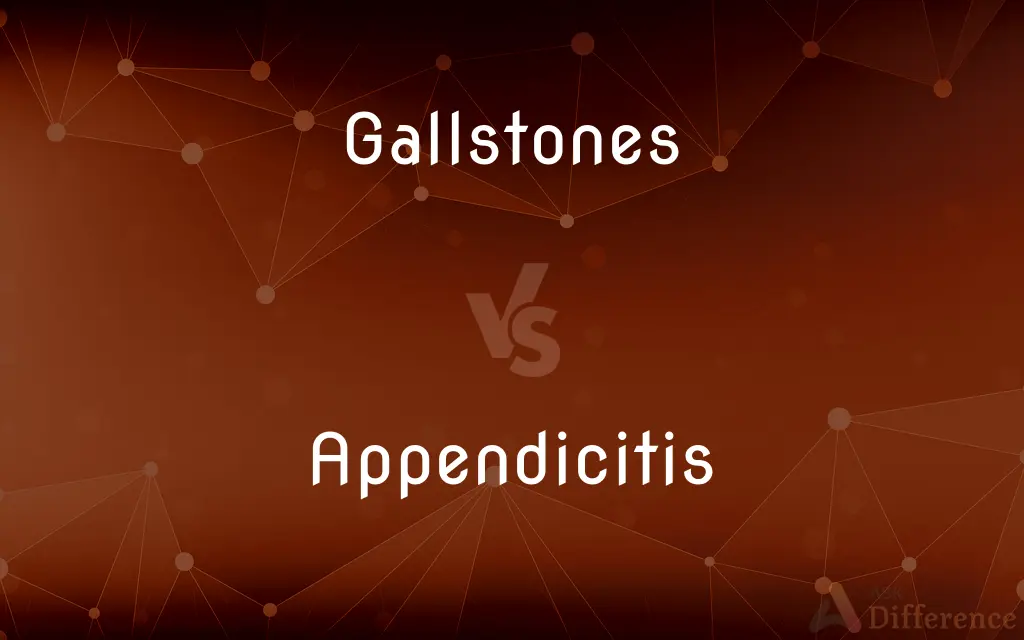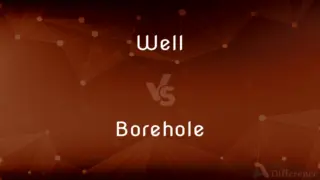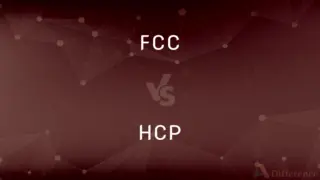Gallstones vs. Appendicitis — What's the Difference?
By Urooj Arif & Fiza Rafique — Published on October 3, 2024
Gallstones are hard deposits in the gallbladder causing pain during movement, while appendicitis is inflammation of the appendix, leading to severe abdominal pain, often requiring surgery.

Difference Between Gallstones and Appendicitis
Table of Contents
ADVERTISEMENT
Key Differences
Gallstones are crystalline deposits that form in the gallbladder, often composed of cholesterol or bilirubin. These stones can block the bile ducts, leading to sharp pain in the upper right abdomen, especially after eating fatty foods. Appendicitis, on the other hand, is characterized by inflammation of the appendix, a small organ attached to the large intestine, which can cause severe pain in the lower right abdomen, fever, and nausea.
The symptoms of gallstones may include intermittent pain known as biliary colic, nausea, vomiting, and digestion problems. These symptoms often flare up after meals. In contrast, appendicitis symptoms start with pain around the navel, which then moves to the lower right abdomen, becoming sharper and more severe. Appendicitis may also be accompanied by loss of appetite, fever, and an inability to pass gas.
Gallstones are diagnosed through ultrasound or other imaging tests that visualize the stones within the gallbladder. Treatment may involve medication to dissolve the stones, lifestyle changes, or surgery to remove the gallbladder. Appendicitis is typically diagnosed based on physical examination, blood tests to check for infection, and imaging tests like an ultrasound or CT scan. The primary treatment for appendicitis is surgical removal of the appendix.
Gallstones can sometimes be managed or treated without surgery, while appendicitis usually requires an urgent surgical intervention known as an appendectomy to prevent rupture of the appendix, which can lead to a serious infection called peritonitis.
Both conditions necessitate medical attention, but the urgency and type of treatment differ significantly. Gallstones may be monitored or treated electively, whereas appendicitis is considered a medical emergency that requires prompt surgical treatment to prevent complications.
ADVERTISEMENT
Comparison Chart
Definition
Hard deposits in the gallbladder
Inflammation of the appendix
Symptoms
Biliary colic, nausea, digestion issues
Severe abdominal pain, fever, nausea
Location of Pain
Upper right abdomen
Lower right abdomen
Diagnosis
Ultrasound, imaging tests
Physical exam, blood tests, imaging tests
Treatment
Medication, lifestyle changes, surgery
Surgery (appendectomy)
Urgency
Variable, may not require immediate surgery
Medical emergency, requires urgent surgery
Potential Complications
Inflammation, pancreatitis, bile duct blockage
Rupture, peritonitis, abscess formation
Compare with Definitions
Gallstones
May cause sharp pain and nausea, especially after fatty meals.
Eating fried food triggered his gallstone symptoms.
Appendicitis
Inflammation of the appendix causing acute abdominal pain.
The sudden, severe pain in his lower right abdomen was caused by appendicitis.
Gallstones
Often detected through ultrasound imaging.
Her gallstones were visible on the ultrasound, confirming the diagnosis.
Appendicitis
Symptoms progress from the navel to the lower right abdomen.
Her pain started near the navel before localizing to the right side, indicating appendicitis.
Gallstones
Solid deposits in the gallbladder causing digestive discomfort.
She was diagnosed with gallstones after experiencing severe pain post-meals.
Appendicitis
Diagnosed through clinical examination and sometimes imaging.
The CT scan confirmed his appendicitis diagnosis.
Gallstones
Treatment can vary from dietary changes to gallbladder removal.
He opted for gallbladder surgery to permanently address his gallstones.
Appendicitis
Considered a medical emergency due to the risk of complications.
His appendicitis led to emergency surgery to avoid rupture and infection.
Gallstones
Some may live with gallstones without symptoms, requiring no treatment.
Despite having gallstones, she experiences no discomfort and needs no treatment.
Appendicitis
Requires prompt surgical removal to prevent rupture.
She underwent an urgent appendectomy to treat her appendicitis.
Gallstones
A small, hard, pathological concretion, composed chiefly of cholesterol, calcium salts, and bile pigments, formed in the gallbladder or in a bile duct.
Appendicitis
Inflammation of the vermiform appendix.
Gallstones
Plural of gallstone
Appendicitis
(pathology) inflammation of the vermiform appendix
Appendicitis
Inflammation of the vermiform appendix.
Appendicitis
Inflammation of the vermiform appendix
Common Curiosities
What's the main difference between gallstones and appendicitis?
Gallstones are solid deposits in the gallbladder, while appendicitis is the inflammation of the appendix, each causing distinct patterns of abdominal pain and requiring different treatments.
How do I know if my abdominal pain is due to gallstones or appendicitis?
The location and nature of the pain can provide clues; gallstone pain is often in the upper right abdomen and related to meals, while appendicitis pain starts around the navel and shifts to the lower right abdomen, becoming constant and severe.
What happens if appendicitis is not treated?
Untreated appendicitis can lead to the rupture of the appendix, causing peritonitis, a serious and potentially fatal infection.
Can you live without a gallbladder or appendix?
Yes, you can live without either organ. The body can adapt to their absence without significant long-term effects.
Can gallstones lead to appendicitis?
No, gallstones and appendicitis are unrelated conditions affecting different parts of the digestive system.
Is there a way to prevent gallstones or appendicitis?
Maintaining a healthy diet and weight can help prevent gallstones. There's no sure way to prevent appendicitis, but a diet high in fiber might reduce the risk.
Is surgery always required for gallstones?
Not always; surgery is recommended if you have symptoms, but asymptomatic gallstones may not require treatment.
Can diet influence gallstones or appendicitis?
Diet can influence the formation of gallstones, particularly a high-fat diet, but it's not a direct cause of appendicitis, although fiber intake may play a preventive role.
Are there any long-term complications after removing the gallbladder or appendix?
Most people do not experience significant long-term complications after gallbladder or appendix removal, though changes in digestion can occur after gallbladder surgery.
How long is the recovery after surgery for gallstones or appendicitis?
Recovery can vary; laparoscopic gallbladder surgery typically allows for a quicker recovery than open surgery, similar to laparoscopic appendectomy, with most patients recovering fully in a few weeks.
Share Your Discovery

Previous Comparison
Well vs. Borehole
Next Comparison
FCC vs. HCPAuthor Spotlight
Written by
Urooj ArifUrooj is a skilled content writer at Ask Difference, known for her exceptional ability to simplify complex topics into engaging and informative content. With a passion for research and a flair for clear, concise writing, she consistently delivers articles that resonate with our diverse audience.
Co-written by
Fiza RafiqueFiza Rafique is a skilled content writer at AskDifference.com, where she meticulously refines and enhances written pieces. Drawing from her vast editorial expertise, Fiza ensures clarity, accuracy, and precision in every article. Passionate about language, she continually seeks to elevate the quality of content for readers worldwide.













































